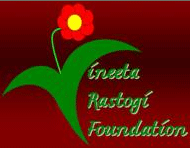
|

|
|
 A Brilliant Young Idealist Left Her Mark on Many |
 She Knew What Was Owed |
| 16 December 1995 | BY COLMAN MCCARTHY | 14 December 1995 |
|
"Sectarianism," Ms. Rastogi said "is the worst disease we face. Rwanda saw 200,000 people hacked to death in less than a month. No disease is that cruel, that uncaring, that unremitting. Even doctors and nurses who are not killed by the hatred must flee from it. Our work, public health, becomes irrelevant when hate-filled strife becomes the norm. "Luckily, unlike so many of the diseases we are fighting," she added, "a cure for strife exists. It is called education." Earlier in her speech, Ms. Rastogi spoke passingly of her recent hospitalization for cancer. Many of her classmates had been praying ardently for her recovery. She was everyone's friend, a giver, a listener and someone whose thirst for social justice prompted those around her to push themselves to become better people. Vineeta died of cancer on Dec. 6. at home with her husband of one year and her parents. I was one of Vineeta's many, many friends, being her teacher at the University of Maryland for two semesters in 1989-90 and having her as an assistant for a third. She graduated magna cum laude and Phi Beta Kappa. When I gave Vineeta extra books to read, she would bring them back the next week and ask for more. She was every teacher's dream student: The more she read and wrote, the more questions she asked, which led to the true excitement of learning: questioning the answers. As with many students in their early 20s who find themselves awash with talents and graces, Vineeta often wondered how and where she might use them. I suggested the Peace Corps for a start and invited Loret Ruppe, the Peace Corps director then. to speak to the class. Vineeta was sold. Two months after graduation she was in Zaire. In Kingandu, a rural village, she lived in a mud hut with no water or electricity. And loved it. She funded and ran the first family planning program in the area. While sitting in an outdoor cafe with some other volunteers one afternoon in Kinshasa, Zaire's capital on the Congo River. Vineeta met her future husband, Brian Hennessey. He was bicycling around the country and passing through town. He stopped when he saw "the most beautiful woman I'd ever seen. They didn't marry right away. After the Peace Corps, and after having had her eyes opened to the need for medical help for rural people. Vineeta enrolled in the Harvard School of Public Health. Incipiently, she understood a truth that often sails 10 feet over the heads of idealists: To do good, you need a skill. Don't answer the call to service with only sentiment, answer it with a usable talent. For Vineeta that would be epidemiology: learning how diseases spread in a given population and how to prevent or eliminate them. Some astute professors at Harvard aware that for some students moments of revelation are as likely to come outside the classroom as in, encouraged Vineeta to move beyond Cambridge as much as possible. And did she. In the summer of 1993, she and Brian went to Vietnam, bicycling 1,000 miles from south to north, visiting health clinics and hospitals along the way. During spring break that year, she was in El Salvador interviewing doctors and nurses who treated victims of land mines. She spent time in health clinics in Cuba and India. For all of this. and for being one of the rare ones who aimed higher than high, the deans of Harvard honored Vineeta at graduation with the Albert Schweitzer Award. It was fitting. At Maryland, one of the essays that most stirred Vineeta was the missionary physician's "Teaching Reverence for Life," and in particular these lines: "No one has the right to take for granted his own advantages over others in health, in talents, in ability, in success, in a happy childhood or congenial home conditions. One must pay a price for all these boons. What one owes in return is a special responsibility for other lives.'' Vineeta knew what she owed. And public health one of the highest callings of all, was her plan to pay in full. She started well, by going all over and all out. |